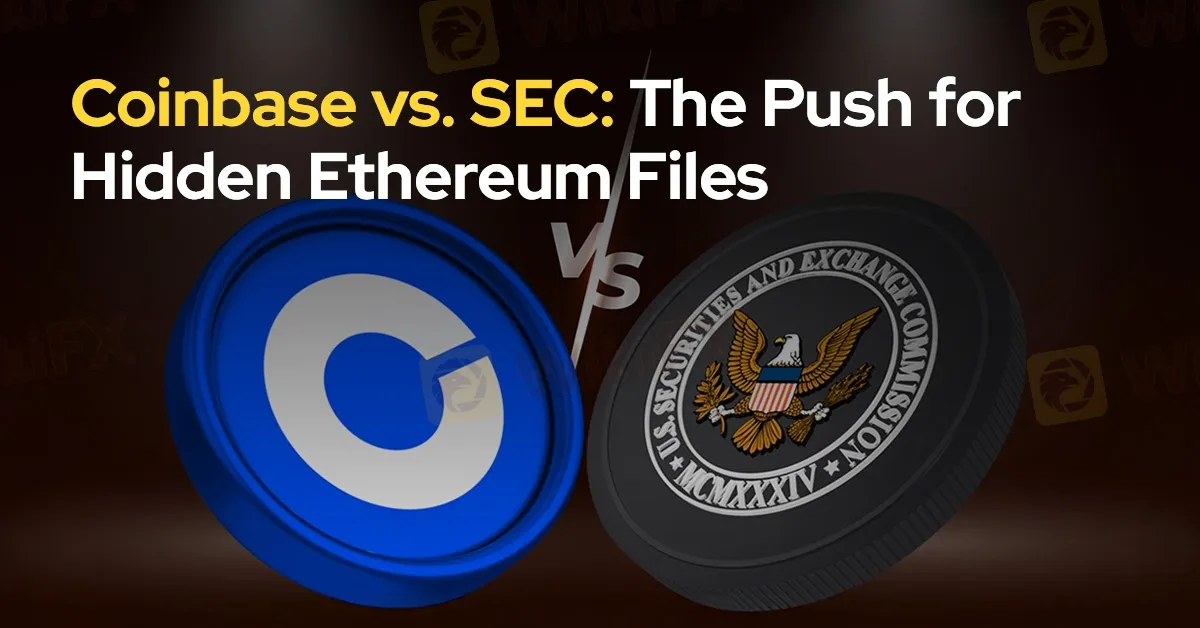简体中文
繁體中文
English
Pусский
日本語
ภาษาไทย
Tiếng Việt
Bahasa Indonesia
Español
हिन्दी
Filippiiniläinen
Français
Deutsch
Português
Türkçe
한국어
العربية
Coinbase vs. SEC: The Push for Hidden Ethereum Files
Abstract:Coinbase is seeking to compel the U.S. Securities and Exchange Commission (SEC) to release internal communications regarding the agency's views on Ethereum (ETH) and other digital tokens.

In an escalating legal dispute, Coinbase is attempting to compel the U.S. Securities and Exchange Commission (SEC) to disclose internal communications regarding its stance on Ethereum (ETH) and other digital tokens. The cryptocurrency exchange has requested that a federal judge determine whether it can access key SEC documents, which had previously been denied. These documents could shed light on how the regulator views the classification of certain cryptocurrencies.
Coinbases interest in these documents stems from ongoing discussions within the SEC regarding whether Ethereum and similar digital tokens should be classified as securities. This issue holds significant implications for the future of the cryptocurrency industry in the U.S., as the regulatory treatment of digital assets remains unclear under existing frameworks.
The legal move follows the SEC‘s initial refusal to comply with Coinbase’s request under the Freedom of Information Act (FOIA). Coinbase had sought information specifically related to communications about Ethereum 2.0, the upcoming evolution of Ethereum‘s blockchain network, in order to better understand the SEC’s position. When the SEC withheld the documents, citing an ongoing investigation, Coinbase initiated legal proceedings, accusing the regulator of obstructing efforts to obtain crucial information.

History Associates, representing Coinbase, has recently filed a notice with the U.S. District Court for the District of Columbia, indicating its intent to pursue partial summary judgment. Coinbase argues that the SEC‘s initial justification for withholding the documents may no longer be valid, given the regulator’s shifting narrative on cryptocurrency regulation.
While the SEC has declined to comment on this specific case, Coinbases legal efforts are part of a larger push for greater transparency and clearer regulatory guidelines for the cryptocurrency sector. In addition to this legal battle, Coinbase is also engaged in other disputes with the SEC, including accusations of operating an unregistered securities exchange. Furthermore, the company is advocating for the creation of cryptocurrency-specific regulations to provide clearer rules for the industry.
Coinbases broader argument is that the SEC has not yet established a coherent regulatory framework for cryptocurrencies. In 2022, the company filed a petition urging the SEC to develop rules that would provide clarity on how digital assets should be regulated. However, this petition was rejected by the SEC in December 2023, prompting Coinbase to seek judicial intervention.
As Coinbase continues its legal battle with the SEC, the outcome could have a significant impact on how cryptocurrencies like Ethereum are regulated in the U.S., potentially setting a precedent that could influence the wider digital asset market.

Disclaimer:
The views in this article only represent the author's personal views, and do not constitute investment advice on this platform. This platform does not guarantee the accuracy, completeness and timeliness of the information in the article, and will not be liable for any loss caused by the use of or reliance on the information in the article.
Read more

Malaysia’s Crypto Landscape: Adapting Amidst Global Ambitions
The United States is intensifying its efforts to become a global cryptocurrency hub under President-elect Donald Trump. Experts believe this move could prompt countries, including Malaysia, to reassess their regulatory approaches toward digital assets.

SEC Approves Hashdex and Franklin Crypto ETFs on Nasdaq
The SEC has approved crypto index ETFs by Hashdex and Franklin Templeton, including Bitcoin and Ethereum, marking a milestone in crypto asset investment.

North Korean Hackers Steal $1.3bn in Cryptocurrency in 2024
Over $2.2bn in cryptocurrency stolen in 2024, with North Korean hackers accounting for $1.3bn. Discover how cyber theft impacts the evolving crypto landscape.

ASIC Sues Binance Australia Derivatives for Misclassifying Retail Clients
ASIC accuses Binance Australia of misclassifying 500+ retail clients as wholesale, denying key consumer protections for crypto derivatives. Penalties and reforms are underway.
WikiFX Broker
Latest News
ASIC Sues Binance Australia Derivatives for Misclassifying Retail Clients
Top 10 Trading Indicators Every Forex Trader Should Know
WikiFX Review: Is FxPro Reliable?
Malaysian-Thai Fraud Syndicate Dismantled, Millions in Losses Reported
Trading frauds topped the list of scams in India- Report Reveals
WikiFX Review: Something You Need to Know About Markets4you
Revolut Leads UK Neobanks in the Digital Banking Revolution
Fusion Markets: Safe Choice or Scam to Avoid?
SEC Approves Hashdex and Franklin Crypto ETFs on Nasdaq
Malaysian Pensioner Loses RM823,000 in Fake Investment Scam
Currency Calculator


